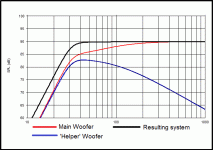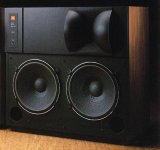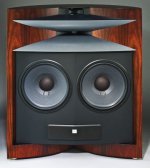If the speaker was 100 dB/meter/watt efficient, the amplifier would have to put out 1600 watts.
That's an appalling thought.
Not only would I not want to be in the same building, I wouldn't want to be in the same neighborhood.
So you don't like live, many like you don't and prefer fake, that's the norm in your high end world - why you have your "beyond the Ariel." favorite compromise ???!! So we realists that love live music over fake use 108/db/watt fully loaded horn speakers and we get live whenever we want it. Transients uncompromised is reality - Perspective is everything. Some like to rave about their new amp or wire - real horny's like to listen without thinking about others dellusion charms. LOL, perspective
This was one kind of papering had been looking for, thanks fas42. I would be interesting to see how conductors orchestrate the same pieces over the years.
Not sure what you mean by "orchestrate" in this statement. Are you referring to the variations in conductors' interpretations of the same pieces? Orchestration is the process of determining which instruments will play which notes (and even which instruments will be used). The great composers of the past did their orchestrations themselves, for the most part (no one else was good enough to do it for them!), sometimes using the help of assistants.
There have been some famous exceptions. Leopold Stokowski re-orchestrated many pieces of standard repertoire, which was (and remains) controversial, for example, Bach's Toccata and Fugue in d minor was originally a pipe organ piece, but Stokowski made (and conducted) his own orchestration in Disney's 1940 classic Fantasia. Modest Mussorgsky's Pictures at an Exhibition was originally a solo piano work, but we are most familiar with Ravel's fabulous orchestration of the work.
The subject of orchestral interpretation by various conductors is perhaps one of the most interesting topics I can think of! There have been great conductors with vastly different philosophies of their role in interpretation. At one end we have people like Leonard Bernstein, who had such strong belief in his own musical instincts that he would at times take things in a direction that the composer would not have had in mind, feeling completely free to do so. I studied with Gunther Schuller, who believed that a conductor's highest calling was to "realize" rather than interpret the score (based upon a quote from Ravel), with the goal of faithfully recreating what the composer conceived. Schuller of course considered expressiveness to be a necessary part of the equation; the music isn't entirely contained in the notes on the page. On the other hand, he didn't extend this philosophy to baroque music (~1600-1750), and wasn't interested in playing Bach and Vivaldi as it would have been done in its time.
I am writing this in hope that it is interesting to some on the forum, not to make a snarky correction. It's not often that I read the word "orchestration" on an audio forum, and after 1,025 pages of discussion, is it really all that far off topic?
Gary Dahl
So you don't like live, many like you don't and prefer fake, that's the norm in your high end world - why you have your "beyond the Ariel." favorite compromise ???!! So we realists that love live music over fake use 108/db/watt fully loaded horn speakers and we get live whenever we want it. Transients uncompromised is reality - Perspective is everything. Some like to rave about their new amp or wire - real horny's like to listen without thinking about others dellusion charms. LOL, perspective
Dude, what are you trying to say? I can't make head nor tails of your post.
Please translate into English: "LOL, perspective" or "dellusion charms" or this sentence "So you don't like live, many like you don't and prefer fake, that's the norm in your high end world - why you have your "beyond the Ariel." favorite compromise ???!!"
Now I'm curious about the actual loudness of the music around me…hmmm, there's an app for that!
In a Acoustics Measurements course I have been partly teaching at the Univerity, one of the lab assignments was to compare smart phone SPL meter apps to a high quality professional SPL meter, for both pure tones and pink noise. The apps are all over the place, usually 5-15dB off, and with poor low and high frequency performance. Even a simple $100 SPL meter is much better.
Bjørn
Just wondering if there is ever any overlap between "orchestration", and "interpretation" - with the latter I'm thinking in particular of the Drottningholm Ensemble's version of Vivaldi's Four Seasons, which was the first I listened to seriously - and completely spoilt me for any other recordings of the piece ... all the others seem to be almost a completely different work - and definitely inferior!I am writing this in hope that it is interesting to some on the forum, not to make a snarky correction. It's not often that I read the word "orchestration" on an audio forum, and after 1,025 pages of discussion, is it really all that far off topic?
Gary Dahl
So we realists that love live music over fake use 108/db/watt fully loaded horn speakers and we get live whenever we want it. Transients uncompromised is reality - Perspective is everything.
Thats because you put transient and SPL in higher priority than others. Perspective is everything. You're free to watch delicate orchestra or boys rock band. And when you watch the rock band, you are also free to choose to stand in front of the bass horn speaker. Because perspective is everything.
...you are also free to choose to stand in front of the bass horn speaker.
I resembled that remark, once upon a time. Trick was to be close enough to stay out of the way of the mid/upper horn.
I used to have my own bass rig that got someway there......
And, yes, between the fast music and the fast cars I have hearing damage.
But I still have no idea what POOH is on about!Because perspective is everything.
Given the above, what do you think of Denon's Ultra-High-Current (UHC) MOSFET amplifier line, initiated back in the early 'nineties with the no-holds-barred POA-S1 monoblocks (see: Denon POA-S1 on thevintageknob.org) and PMA-S1 integrated, and then trickled down to the various more affordable PMA-S10, PMA-2000/2010/2020... and even the 'anniversary edition' PMA-A100?
All of these use a single pair of power output devices, reportedly with the aim of limiting the low-level distortion of which you speak.
From my personal experience (with the PMA-S1 and then PMA-A100), these sound pretty sweet as far as transistor amps go.
Marco
So it seems nobody has anything to say about these amps.
OK.
It may be just that no-one has had the chance of listening to them (especially the really good ones, like the S-1).
Yet, somehow I can't help but get the feeling that many people tend to make too many sweeping generalizations about how transistor amps sound, as if they all sounded the same...
Marco
The extremely low Qts of the 515 Alnico results in a Lowther-like sloping response. In normal applications, this calls for horn loading to straighten out the response, but the secondary woofer lets Gary play around with crossover overlap to offset the falling in-room characteristic, while retaining the upper-bass virtues of the 515.
A similar design topology (2 1/2 ways with two low-Q woofers) has been used in a number of commercial speakers, like JBL's 4435 (simulation attached below) and DD66000/65000/67000 'Everest' (the latter also employ a supertweeter, but that's off topic here).
Attachments
Just wondering if there is ever any overlap between "orchestration", and "interpretation" - with the latter I'm thinking in particular of the Drottningholm Ensemble's version of Vivaldi's Four Seasons, which was the first I listened to seriously - and completely spoilt me for any other recordings of the piece ... all the others seem to be almost a completely different work - and definitely inferior!
As proficient a violinist as he is Nigel Kennedy spoilt this piece as I can only see his punk rock image when he was popularising classical music for the less musically switched on UK nubies to classical music when I hear it. I have tried deconditioning and it does not work for me. I had a problem with Beethovens Pastoral after hearing a performance conducted by Sir Colin Davis. That had different connotations. In the end music is such a personal thing experienced on such a large scale.
By the way Nigel and Colin are extremely competent musicians
Last edited:
A similar design topology (2 1/2 ways with two low-Q woofers) has been used in a number of commercial speakers, like JBL's 4435 (simulation attached below) and DD66000/65000/67000 'Everest' (the latter also employ a supertweeter, but that's off topic here).
Hello Marco,
From memory such topology has been also used to give to the couple of bass loudspeakers a given radiation shape with a off axis of the radiation lobe.
Do you know if with the Everest DD66000 there is a left marked and a right marked enclosures?
Best regards from Paris, France
Jean-Michel Le Cléac'h
Yes there is! I own a couple on the iPhone. Even have the calibrated measurement mic for mobile phone that Parts Express sells. Super handy.Now I'm curious about the actual loudness of the music around me…hmmm, there's an app for that!
Hello Marco,
Do you know if with the Everest DD66000 there is a left marked and a right marked enclosures?
Best regards from Paris, France
Jean-Michel Le Cléac'h
Dear Jean-Michel,
as far as I know, both enclosures are identical, and the crossover can be configured by jumpers behind the faceplate so that either woofer can operate as the 'helper' (1st-order low-passed at 150Hz).
By the way: I'm in Paris relatively often... I'd love to meet up for a 'friendly listen' sometime! And of course you're more than welcome to visit me here in London if/when you happen to be around.
Cheers,
Marco
Just wondering if there is ever any overlap between "orchestration", and "interpretation" - with the latter I'm thinking in particular of the Drottningholm Ensemble's version of Vivaldi's Four Seasons, which was the first I listened to seriously - and completely spoilt me for any other recordings of the piece ... all the others seem to be almost a completely different work - and definitely inferior!
In the baroque period there was a huge overlap. And I agree completely about the virtues of authentic baroque performance practice!
More about this later…
Gary Dahl
…
The subject of orchestral interpretation by various conductors is perhaps one of the most interesting topics I can think of!
…
Indeed, it is so.
Yet, not having any formal education in music, I evaluate various interpretations only by my emotional impact, listening to various interpretations.
My favorite composer is Gustav Mahler.
So far, I prefer the conducting/interpretation of Georg Solti. I cannot say why it is so.
In the baroque period there was a huge overlap. And I agree completely about the virtues of authentic baroque performance practice!
More about this later…
Gary Dahl
Generally speaking, I also prefer baroque performances with authentic instruments.
My favorite composer is Gustav Mahler.
So far, I prefer the conducting/interpretation of Georg Solti. I cannot say why it is so.
Barbirolli for me. If you haven' t listened to his Mahler interpretations, I recommend it.
Barbirolli for me. If you haven' t listened to his Mahler interpretations, I recommend it.
Thank you.
I haven't heard Barbirolli so far. I'll look for LP's or CD's.
~~~~~~~~~~~~~~~~~snip~~~~~~~~~~~~~~~~~~~
I am writing this in hope that it is interesting to some on the forum, not to make a snarky correction. It's not often that I read the word "orchestration" on an audio forum, and after 1,025 pages of discussion, is it really all that far off topic?
Gary Dahl
Hi Gary,
I found your post and thoughts on the subject to be very interesting. No apologies needed here!
Best Regards,
TerryO
- Home
- Loudspeakers
- Multi-Way
- Beyond the Ariel


